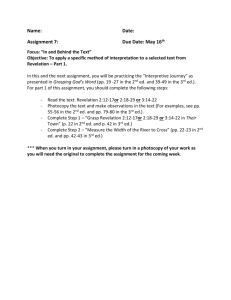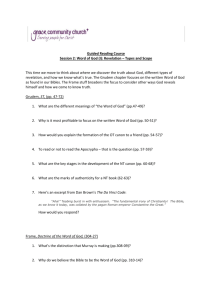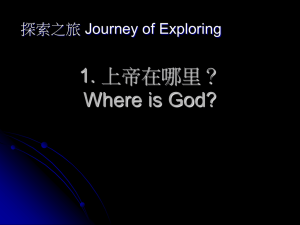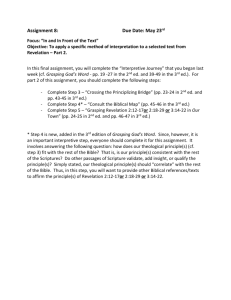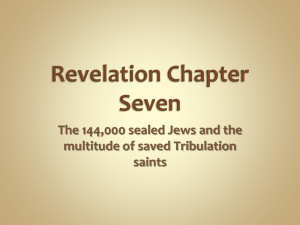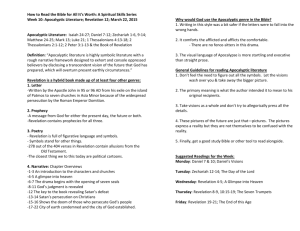Revision - Belief and Science - Jan 2010
advertisement
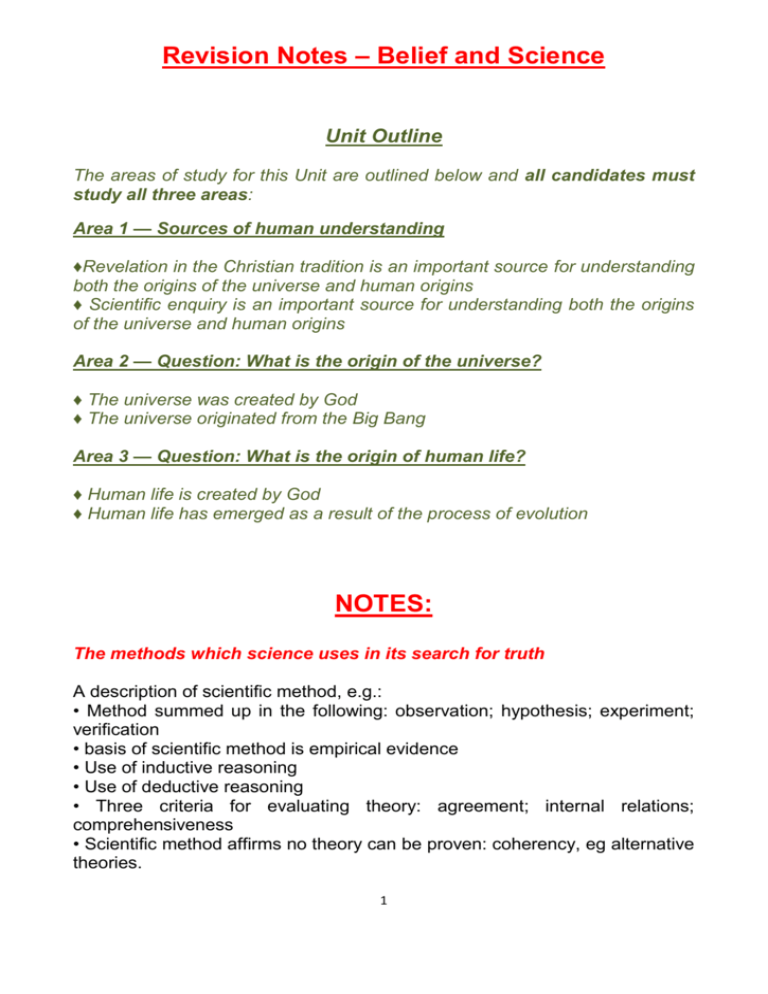
Revision Notes – Belief and Science Unit Outline The areas of study for this Unit are outlined below and all candidates must study all three areas: Area 1 — Sources of human understanding ♦Revelation in the Christian tradition is an important source for understanding both the origins of the universe and human origins ♦ Scientific enquiry is an important source for understanding both the origins of the universe and human origins Area 2 — Question: What is the origin of the universe? ♦ The universe was created by God ♦ The universe originated from the Big Bang Area 3 — Question: What is the origin of human life? ♦ Human life is created by God ♦ Human life has emerged as a result of the process of evolution NOTES: The methods which science uses in its search for truth A description of scientific method, e.g.: • Method summed up in the following: observation; hypothesis; experiment; verification • basis of scientific method is empirical evidence • Use of inductive reasoning • Use of deductive reasoning • Three criteria for evaluating theory: agreement; internal relations; comprehensiveness • Scientific method affirms no theory can be proven: coherency, eg alternative theories. 1 Revelation is important for Christians – here is why • Moses on Mount Sinai. • The supreme revelation of God in Christ. • Revelation means that God has taken the initiative in revealing something of his attributes to humans. • Theology would be impossible without a self-revelation of God. • Revelation is a supernatural act of self-communication – a purposeful act on the part of God. General and Special Revelation • General – ‘revelatio realis’ – a revelation in nature, in human consciousness and in the providential government of the world. • Special – ‘revelatio verbalis’ – a revelation embodied in the Bible as the word of God. • General is rooted in creation, addressed to human reason. It finds its purpose in the realisation of the end of his creation – to know God and enjoy communion with Him. • Special is rooted in the redemptive plan of God – is addressed to man as sinner and can be understood by faith. • Special revelation gives knowledge of mysteries – Trinity, Incarnation, and Redemption. It is not rationally demonstrable but must be accepted by faith. • The only proper way to obtain perfectly reliable knowledge of God’s attributes is by a study of God’s self-revelation in Scripture. • Revelation through the works of God – nature – God as designer and purposer. • Revelation through the word of God – scripture providing truth in all matters of experience including history and science. The differences between the scientific method and revelation • Scientific method depends on observation, hypothesis, prediction and verification. • Observes the concrete. • Open to change. • Open to verification. • Truths revealed are true until something better comes along. • Objective. 2 Revelation • Interpretation of events is important. • Truths are eternal. • Does not submit to usual rules of verification. • Faith required. • Subjective. The limitations might there be in both scientific method and revelation Candidates may be awarded 3 marks for a good description of each concept. Where an expanded description of one concept is given, a maximum of 4 marks may be awarded. • Deductive method – things do not always square with experience. • Faith dependent on personal commitment. • The method of science based on empirical evidence. • Belief in the impartiality of science – it begins from a neutral standpoint. • Scientific method is grounded in fact, experiment and proof. • Religious questions not testable by observation. • Dangers of literalism. • Revelation based on faith but for the religious believer this leads to certainty – certainty born of personal conviction. • Science can give proof obtained from the best possible evidence – it is a proof, based on our present knowledge, always open to the possibility of future revision. • Danger of use of models in science and religion. • Language of religion not disinterested. • No scientific theory is safe for all time – Ptolemaic view of universe was falsified by Copernicus – the physics of Newton superseded by Einstein. • Scientific theories ultimately only hypotheses open to refutation. • Uninterpreted experience leads to misinterpretation. The evidence used to support the Big Bang Theory • Heat. • Redshift of galaxies. • Microwave background radiation. • Primordial elements. • Spread and distribution of galaxies. • Inflation. 3 Christians reasons for rejecting the Big Bang Theory • Not in the Bible. • Bible version is true, science is wrong. • Big Bang has limitations. • There are other theories. • Denies that God is creator. • Denies that God is the designer. • Removes God from the process of creation. • Removes purpose from creation. Ways in which Christians might understand the creation stories in Genesis. • Christian understanding of God’s role in creation • Literal. • Part literal/part myth. • Myth. • Candidates may give examples of understandings. Christians insist on a literal understanding of the Genesis creation stories because... • God revealed his word to humans. • God’s word is infallible. • Why would God not speak the truth in the Bible? • God’s word is plain and simple. • Science contradicts Biblical understanding of creation. • If you question one part of the Bible you have to question it all. • The Bible is timeless; truths apply to all ages. • The evidence for the Big Bang and evolution is by no means conclusive. Christians raise objections against a literal understanding of the Genesis creation stories because... • The views of scientists who are Christians, eg Peacocke; Polkinghorne − theistic evolution. 4 • The Bible has to be seen in its cultural context. • The Bible is a record of spiritual experience. • The Bible is not a science book. • The Bible authors did not write it as science. • Interpretation could be inconsistent – which bits should be literal and which should be symbolic. • Ancient people taught through myths and stories, Bible do that. • Literal interpretation can quickly discredit the Bible. • Outline of non-literal interpretation plus analysis. The key features of the cosmological argument. • Aquinas proposed it. • Everything has a cause. • Nothing exists by itself. • Can’t have an infinite regression of causes. • Must be a first cause. • Must be an uncaused cause. • Uncaused cause is God. • (Or any alternative to Aquinas, e.g. Kalam argument) The Big Bang Theory compatibility with the cosmological argument • Big Bang suggests a beginning. • No pre-existing matter. • Something cannot come out of nothing. • Something had to cause Big Bang. • Cause was God Explain how the Teleological Argument uses observation of the world to support Christian belief in God. • A special application of the Cosmological argument. • Infers the existence of God from the presence of order. • Order is seen as a mark of design. 5 • Coincides with a revival of interest in natural theology. • Analogy is between the universe and a man-made machine – Paley’s watch. • Human eye cited as evidence/comparison. • Causal link watch – watchmaker - God. • Just as design apparent in watch could not have happened by chance, so ‘design’ in universe – including living creatures/humans – demand a designer to explain them. • Swinburne: order means world runs according to regular laws. God responsible for scientific laws – the explanation for the orderliness of the universe. The main points of Paley’s design argument • The conclusion that the watch had been designed and made would not be weakened if one had never seen a watch before. • The existence of a designer and maker of the watch would not be negated if the watch went wrong on occasions or did not work at all. • The fact that the watch had been designed and made would not be negated if there were parts of the watch whose workings were not understood. • Something as complex as a watch could not appear out of nowhere. • Same applies to the universe and life forms. Candidates’ answers will revolve around these ideas and relate them to the universe. In fact replace ‘watch’ with ‘universe’ in the above! The key descriptive features of evolutionary theory. A brief outline only is required but it would be expected that candidates use some of the following to gain full marks: • key to the theory is ‘natural selection’ • within species, individual members may have particular characteristics which help them to survive • advantages are passed on through reproduction • over generations the characteristics which improve chances of survival will 6 be found in an increasing number of individuals • By this process nature selects those most fit to survive. Scientific evidence put forward to support evolutionary theory • Big Bang theory. • Theories of evolution/Darwin’s discoveries. • Discoveries in astronomy. • Discoveries in cosmology. • Discoveries in biology. • Archaeological evidence/Palaeontological evidence. Describe Christian views on the importance of humans in the universe. • Humans are at the centre of creation. • Universe created for human beings. • God reveals himself to human beings. • God has a special role for human beings. • God loves human beings more than anything else. • God has given human beings a special purpose. • God has allowed human beings to have a relationship with him. • God has imbued human beings with soul. 7 “For some Christians there is no contradiction in believing that God created human life and also believing in the theory of evolution.” Can this claim be justified? Candidates should identify compatibility and explain strengths of interpretations which suggest Christian belief and evolutionary theory are compatible. • Evolution can be seen as a creative process with God behind it. • Evolution shows the power of God and enhances belief. • Evolutionary theory explains how life developed, revelation explains why (complementary) • Religious and scientific truth is different and should not be confused (e.g. Teilhard, Peacocke, and Polkinghorne). • Anthropic principle supports existence of an intelligent designer. • Acceptance by Christians that there is random chance but that the rules were formulated by God. • A theistic interventionist approach suggests that evolution is acceptable but God intervenes directly. Body of Adam result of natural selection from other species, but the soul created directly by God. • Evolution is the mechanism by which God creates and operates. • Vitalism (Bergson) sees the action of God within the evolutionary process. • Evolution is purposeful (Peacocke) – God’s activity determines the ‘final causes’ of everything. • A problem arises in this debate – how is it possible to relate an autonomous universe with what religious people want to claim as the action of God? 8 “Revelation and evolutionary theory both understanding of the origins of human life.” contribute to a full Explain how scientists might respond to this statement. KU • Revelation. • Big Bang theory • Theories of evolution − This will be acceptable even though candidates will have covered this in part (a). AE Points against the statement • Revelation is at odds with evolution. • Revelation does not account for much scientific data. • Science deals in facts not emotions and beliefs. • Revelation always wants to bring God into the debate. • What other explanation is there? – life is here ... end of story. • Science does not make absolute statements – it has the humility to be tentative in its assertions. • Science has nothing to say about revelation and vice versa. • Creation scientists would be uncomfortable with statement. • Creation scientists would go for Noahaic Flood explanation of evolutionary evidence. 9 Points for the statement • More to human origins than scientific facts. • Evolutionary theory is full of belief too. • Revelation can explain the purpose behind our existence, science cannot do this. • Revelation looks for purpose not causes – universe is full of cause and purpose. • World can be interpreted in more than just a factual way. • Literalists should be discounted; most Christians do not see revelation in this way and can therefore accept aspects of evolution. • Evidence of design in evolution. • Anthropic principle could be discussed. • Religion and science ask complimentary questions. • Many Christians accept discoveries of science. • Christians use science to attach purpose to causes. • Science uses religion to attach causes to purpose. • The statement is extreme; there is plenty of agreement in between extremes. 10
